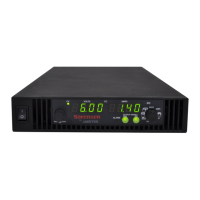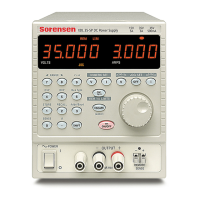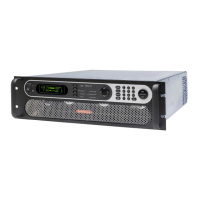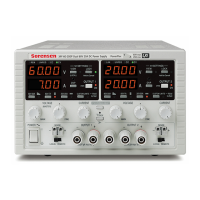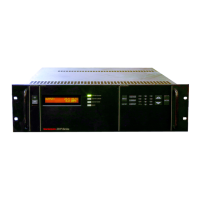Overview DC Asterion Series
3-48 M330460-01 Rev A
3.5.3 Remote Voltage Programming by 4-20mA Source
A 4-20mA current source is connected between Pin 4 (VPRG_VSOUR) and the return
Pin 18 (RTN_PRG) and select the Analog Reference Source as 4-20mA in front panel.
Refer to Figure 3-103.
The transfer function for the output voltage will be as follows:
Vout = (I4-20mA – 4) (100% rated output voltage) / 16, with I4-20mA in mA
Which produces 0V output voltage at 4mA and 100% rated output voltage at 20mA.
Figure 3-103. Remote Voltage Programming Using 4-20mA Source
3.6 Remote Power Programming
Remote power programming is summed with the front panel or digital setting; see
Section 3.3. Remote power programming configuration is used for applications that
require the output voltage be programmed (controlled) from a remote instrument. An
external resistance or external voltage source or 4-20mA source may be used as a
programming device. When using remote voltage programming, a shielded, twisted-
pair cable is recommended to prevent noise interference to programming signals.
3.6.1 Remote Power Programming by Resistance
Analog Reference source is selected as Resistance from the front Panel. Refer to
Figure 3-104. The resistance-programming default coefficient for output power is
(100% rated output power) / 5 kΩ, with input at Pin 34 (PPRG_ISOUR) and return to
Pin 18 (RTN_PRG). An internal current source, factory-set at 1 mA, from Pin 20 is
utilized to drive the resistance. This produces a transfer function for output power, as
follows:
Pout = R * (100% rated output power) / 5 kΩ), with R in kohms.
Full Scale power programming resistance can be modified from default 5kOhms to any
other value, from 2 kOhm to 10 kOhm. Refer to Section 3.1.8.3. Then the transfer
function for output power, as follows:
Pout = R * (100% rated output power) / FSC kΩ), with R in kohms.

